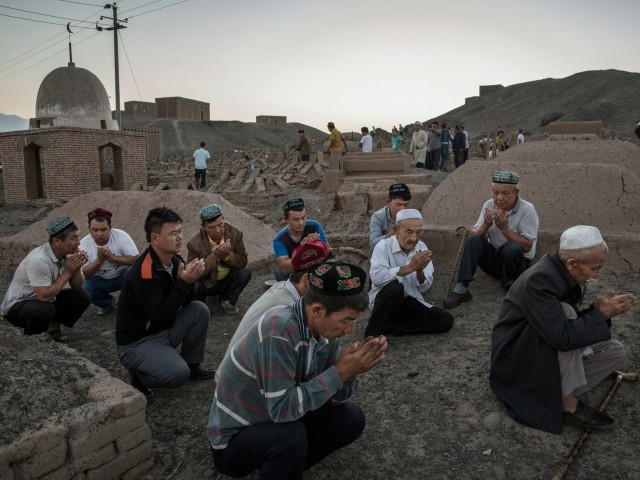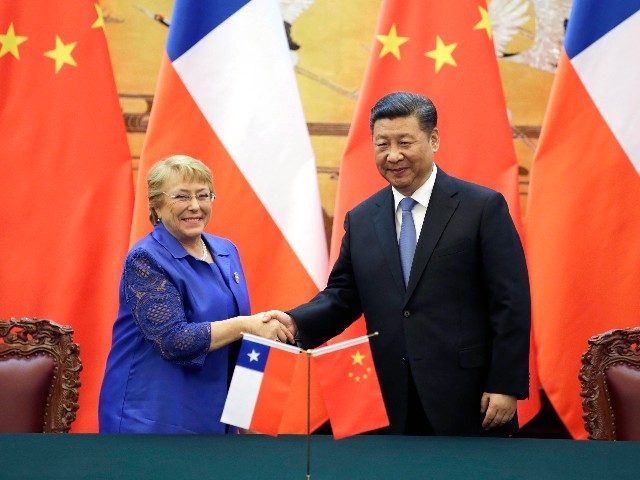United Nations High Commissioner for Human Rights Michelle Bachelet announced at a meeting Monday that she would not seek to continue in the post after her term expires in August, a move made public shortly after international calls for her resignation followed a visit to China in which Bachelet praised the Communist Party for its alleged human rights successes.
Bachelet traveled last month to East Turkistan, an occupied western region China refers to as Xinjiang, to allegedly investigate the extensive evidence that the Communist Party is engaging in genocide against the native ethnic groups of the region, most prominently the Uyghur majority there.
Eyewitness testimony, academic studies, satellite evidence, and other forms of data have revealed that China has imprisoned millions of non-Han ethnic minority members in concentration camps, forcibly sterilized an untold number of women to prevent non-Han populations from growing, and enslaved at least hundreds of thousands in cotton fields and factories.
Bachelet issued a final statement shortly before leaving China in which she did not use the word “genocide” or address those concerns, instead praising the Chinese government for its “tremendous achievements.” Bachelet claimed that the Communist Party had shut down all of its concentration camps for ethnic minorities, using the government’s preferred euphemism for the facilities: “vocational education and training center.”
Prior to running the U.N. human rights office, Bachelet served as the far-left socialist president of Chile, where she invested heavily in making Chile economically dependent on China. China is currently Chile’s largest trade partner, according to the World Bank.
Bachelet made her announcement that she would no longer serve in her role once her term ends at the conclusion of her update to the Human Rights Council on her office’s activities on Monday.
“As my term as High Commissioner draws to a close, this Council’s milestone fiftieth session will be the last which I brief,” Bachelet announced.
The human rights chief did not elaborate on her comment.
The U.N. secretary-general appoints the high commissioner for human rights, with the General Assembly given approval power, for up to two four-year terms. Bachelet could choose to seek approval for another four years – resulting in a maximum term of eight years.
Without clarifying her remark, Bachelet concluded by urging the members of the widely discredited Human Rights Council to “continue to seek dialogue, to be willing to hear the other, to understand respective points of view and to actively work towards identifying common ground, as prerequisites to achieving durable solutions to the challenges that threaten us all.”
Elsewhere in her remarks on Monday, Bachelet updated the U.N. on her activities around the world since the past Human Rights Council session, which include her trip to China. Just as in her remarks from China, Bachelet did not address the ongoing genocide in China, promising generally that her “office’s assessment of the human rights situation in Xinjiang is being updated.”
“We had discussions on specific human rights concerns,” Bachelet said, referring to talks with Chinese Communist Party officials, “including human rights violations in the context of China’s policies for countering terrorism and safeguarding national security, protection of the rights of ethnic and religious minorities, judicial and legal protection including for women, human rights in the digital space, and business and human rights.”
“I also raised concerns regarding the human rights situation of the Uyghur and other predominantly Muslim minorities in Xinjiang,” Bachelet claimed on Monday, “including broad arbitrary detention and patterns of abuse, both in the VETC system and in other detention facilities.”
Bachelet revealed that the Chinese government would review her office’s assessment of Xinjiang “for factual comments” before the public will be allowed to see it.
The human rights head also appeared to justify the genocide by echoing the Chinese government’s claim that the genocide is necessary to combat terrorism.
“Terrorism is a scourge that unites us all in horror and commitment to combat it,” Bachelet said. “But there can only be success in countering terrorism if, in doing so, we fully live up to the values we are defending.”
Bachelet did not spend most of her address on China. Much of it emphasized “sustainable development” and climate change provisions, which she defined as part of human rights, as well as listing several countries that she said she was concerned about regarding their human rights situations. Bachelet made special notes of the United States – calling the growing pro-life movement a threat to the “essential right” of abortion – the United Kingdom, and Israel.
Bachelet was facing widespread calls for her resignation shortly before announcing she did not intend to seek a second term. Uyghur advocacy groups, in particular, condemned Bachelet and the United Nations in general for failing to condemn the genocide the ethnic population is facing.

Uyghur men perform prayers for ancestors at a cemetery before the Corban Festival in Turpan County, in the far western Xinjiang province, China (Photo by Kevin Frayer/Getty Images).
“The high commissioner has disgraced herself and her office by refusing to investigate China’s genocide and adopting, repeating the Chinese regime’s narrative, further cementing their propaganda in the U.N.,” Campaign for Uyghurs executive director Rushan Abbas said shortly after Bachelet’s visit.
Bachelet has “shown us that nobody cares about our human rights, and that restoring East Turkistan’s independence is the only solution to end the ongoing genocide and ensure our peoples’ very existence and freedoms,” Salih Hudayar, the prime minister of the East Turkistan government-in-exile, said in response to the U.N. official’s assessment of the situation in the region.
Bachelet angered the human rights community on two occasions during her trip to China. On one occasion, Bachelet held a virtual meeting with dictator Xi Jinping in which, rather than condemning him for the widely documented human rights abuses that he has orchestrated, Bachelet praised Xi for China’s human rights record. The Chinese Communist Party, hardly an unbiased source, published paraphrased remarks from Bachelet, but she did not challenge them.
“Ms. Bachelet expressed appreciation to China for receiving her visit despite the [Chinese coronavirus] challenge, the first visit to China by the UN High Commissioner for Human Rights in 17 years,” according to the Chinese Foreign Ministry, which added:
She expressed admiration for China’s efforts and achievements in eliminating poverty, protecting human rights and realizing economic and social development, and commended China’s important role in upholding multilateralism, confronting global challenges such as climate change, and promoting sustainable development across the world.
In a video address from Guangzhou, China, Bachelet similarly lauded China for alleged human rights “achievements” after having visited East Turkistan.
“Poverty alleviation and the eradication of extreme poverty, 10 years ahead of its target date, are tremendous achievements of China,” Bachelet said of her visit to East Turkistan. “The introduction of universal health care and [an] almost universal unemployment insurance scheme go a long way in ensuring protection of the right to health and broader social and economic rights.”
The former Chilean president added that she visited a “vocational education and training center” (concentration camp) and that the communist regime had assured her that the camps had been dismantled.
During Bachelet’s visit to East Turkistan, scholar Adrian Zenz and the Victims of Communism Memorial Foundation published a massive document dump dubbed the “Xinjiang Police Files” showing hundreds of “mug shots” of concentration camp victims, photos of police training to repress Uyghurs, and speeches by senior officials indicating that Xi had personally orchestrated the genocide. Bachelet has yet to address the revelation at press time.

COMMENTS
Please let us know if you're having issues with commenting.